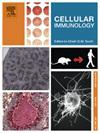乳腺癌干细胞将抗肿瘤CD4+ T细胞转化为促肿瘤T调节细胞:外泌体FOXP3的潜在作用
IF 2.9
4区 医学
Q2 CELL BIOLOGY
引用次数: 0
摘要
肿瘤的进展及其治疗反应受肿瘤微环境(tumor microenvironment, TME)的调控。肿瘤启动性癌症干细胞(CSCs)与TME保持着持续的交流,并通过几种机制对其进行调节。在这里,从计算机发现和分析乳腺癌患者组织来源的数据,发现CSCs和Tregs呈正相关。此外,我们的计算机分析强调了CSC基因与Treg标记物FOXP3之间的正相关,即使在不含任何T细胞或Treg细胞的癌细胞系中也是如此,从而提高了CSC表达FOXP3的可能性。验证我们的假设,在乳腺CSCs中观察到FOXP3在mRNA和蛋白水平上的表达高于非干细胞。由于一小群CSCs在免疫细胞主导的TME中引发肿瘤,我们旨在探索乳腺CSCs是否直接将FOXP3转移到CD4+T细胞中以产生免疫抑制的Treg细胞。首先,我们的研究发现csc衍生的外泌体(CDEs)在24小时的早期时间点产生CD4+CD25+FOXP3+ treg,其本质上具有免疫抑制作用。接下来,检测CDEs中FOXP3蛋白的存在,表明FOXP3通过CDEs转移的可能性很大。在翻译抑制剂处理的T细胞暴露于cde后12小时检测到FOXP3水平升高,这一点得到了支持。最后,来自FOXP3减弱的cscs的外泌体在T细胞中提供的FOXP3低于对照CDEs。该机制在小鼠体内模型中得到了验证。综上所述,这些结果表明csc来源的FOXP3在将T细胞重编程为免疫抑制性Treg细胞中的作用迄今尚未被探索。本文章由计算机程序翻译,如有差异,请以英文原文为准。
Breast cancer stem cells convert anti-tumor CD4+ T cells to pro-tumor T regulatory cells: Potential role of exosomal FOXP3
Cancer progression and its treatment-response are regulated by the tumor microenvironment (TME). Tumor-initiating cancer stem cells (CSCs) remain in constant communication with the TME, and modulate it through several mechanisms. Here, from in-silico findings and analyzing breast cancer patient tissue-derived data, CSCs and Tregs were found to be positively correlated. Furthermore, our in-silico analyses highlighted a positive relationship between CSC genes and Treg signature marker, FOXP3, even in cancer cell lines that do not contain any T cell or Treg cells, thus raising the possibility of CSCs expressing FOXP3. Validating our hypothesis, higher expression of FOXP3, both at mRNA and protein levels, was observed in breast CSCs than non-stem cancer cells. Since a small population of CSCs initiate tumor in immune cell-dominated TME, we aimed at exploring whether breast CSCs directly transfer FOXP3 to CD4+T cells to generate immunosuppressive Treg cells. First, our search revealed CSC-derived exosomes (CDEs) generated CD4+CD25+FOXP3+ Tregs at an early time-point of 24 h, which were immunosuppressive in nature. Next, detecting presence of FOXP3 protein in CDEs showed a strong possibility of FOXP3 transfer through CDEs. This was supported by detecting elevated FOXP3 levels from 12 h in translation inhibitor-treated T cells upon CDE-exposure. Finally, exosomes derived from FOXP3 attenuated-CSCs furnished lower FOXP3 in T cells than control CDEs. This mechanism was validated in in-vivo murine model. Together these results indicate a hitherto unexplored role of CSC-derived FOXP3 in reprogramming T cells into immunosuppressive Treg cells.
求助全文
通过发布文献求助,成功后即可免费获取论文全文。
去求助
来源期刊

Cellular immunology
生物-免疫学
CiteScore
8.20
自引率
2.30%
发文量
102
审稿时长
30 days
期刊介绍:
Cellular Immunology publishes original investigations concerned with the immunological activities of cells in experimental or clinical situations. The scope of the journal encompasses the broad area of in vitro and in vivo studies of cellular immune responses. Purely clinical descriptive studies are not considered.
Research Areas include:
• Antigen receptor sites
• Autoimmunity
• Delayed-type hypersensitivity or cellular immunity
• Immunologic deficiency states and their reconstitution
• Immunologic surveillance and tumor immunity
• Immunomodulation
• Immunotherapy
• Lymphokines and cytokines
• Nonantibody immunity
• Parasite immunology
• Resistance to intracellular microbial and viral infection
• Thymus and lymphocyte immunobiology
• Transplantation immunology
• Tumor immunity.
 求助内容:
求助内容: 应助结果提醒方式:
应助结果提醒方式:


